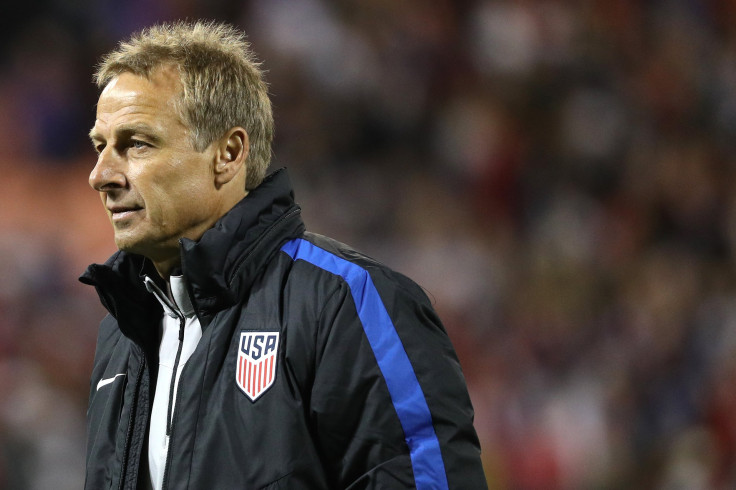Jurgen Klinsmann To Be Fired? Who Could Replace USA Soccer Coach?

In his more than five years in charge of the United States men’s soccer team, Jurgen Klinsmann has displayed an uncanny ability to repeatedly bounce back from major setbacks. Just as murmurs surface of his job coming under threat, his players provide a performance that, at least temporarily, sends his critics to the back of the room.
But after so many recoveries, and with the beleaguered state of the team's World Cup hopes, his time might finally be up.
After suffering a first World Cup qualifying home loss since 2001, against fierce foe Mexico of all teams, Klinsmann needed a big response from his players Tuesday night in Costa Rica. Instead, what he got was a capitulation to the U.S. team’s worst qualifying loss in 36 years.
Rather than taking the U.S. forward to become a major power capable of asserting itself on the world stage, he had presided over a 4-0 defeat more in keeping with the dark years in which even reaching the World Cup was a challenge.
For Klinsmann, the fact that his team sits on zero points from its first two games of the final round of Concacaf World Cup qualifying, known as the Hexagonal, is bad enough. What adds to his woes is that there is now a four-month break for everyone involved to stew on what transpired in San Jose and whether the moment has arrived to halt Klinsmann’s project.
With a lucrative contract that also provides him the role of technical director of U.S. Soccer, it has always looked like it would take something as cataclysmic as actually failing to make the World Cup for the first time since 1986 for him to lose his job. However, the comments of U.S. Soccer President Sunil Gulati after the loss in Costa Rica suggested that at the very least Klinsmann’s future is being considered.
“We won’t make any decisions right after games,” he told reporters at the Estadio Nacional. “We’ll think about what happened today and talk with Jurgen and look at the situation. Obviously, it’s not a good start to the Hex, and today, in particular, was not a good performance.”
If Gulati is to make a change during the qualifying campaign then the time is probably now. A new coach would have four months to acclimate and assess the job at hand. And, with eight matches remaining and three automatic places along with one playoff spot available for Russia 2018, there remains ample opportunity for the U.S. to overcome its nightmare start.
But of course, there is the question of who would come next. When Gulati dispensed with Bob Bradley following defeat in the 2011 Gold Cup final it was because he finally saw the chance to get Klinsmann, a man he had long pursued to take the U.S. team to the next level. There is no candidate that will stick out the same way this time.
There is one obvious choice to turn to in the current predicament, however. That man is Bruce Arena, who knows the vagaries of the national team setup having coached the U.S. between 1998 and 2006, during which he guided the country to its best ever World Cup finish when reaching the quarterfinals in 2002. Currently in charge of the LA Galaxy, where he has won three MLS Cups, the 65-year-old is widely seen as the finest coach the U.S. has ever produced.
If Klinsmann is fired, the name most likely to replace him: Bruce Arena.
— Grant Wahl (@GrantWahl) November 16, 2016
If U.S. Soccer wants to look at younger options in Major League Soccer there are other intriguing candidates, too.
Orlando City SC head coach Jason Kreis, 43, was considered an option in 2011, and his name could resurface. Peter Vermes, a former U.S. international, has guided Sporting Kansas City to an MLS Cup and U.S. Open Cup in his seven years in charge. There could also be a case for looking at Jesse Marsch, a former assistant coach of the U.S. who has led the New York Red Bulls to a Supporters Shield and a second-place finish in the regular-season standings in his two years in charge.
The man who beat Marsch out for the Supporters Shield this year, Colombian Oscar Pareja may also make any list of candidates after impressively guiding a young roster at FC Dallas. If U.S. Soccer does intend to go foreign once again then former Chile and Argentina coach Marcelo Bielsa may be in the mix.
© Copyright IBTimes 2024. All rights reserved.











